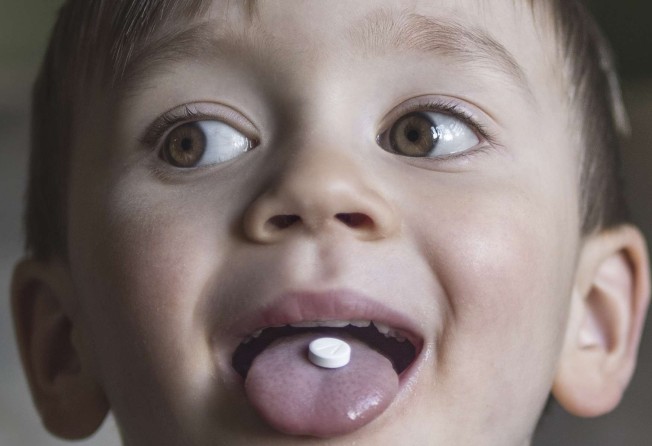
Giving babies antibiotics may increase risk of them having food allergies
Babies prescribed antibiotics 1.21 times more likely to be diagnosed with food allergy. In other news: three days of high-intensity workouts could impair the immune system

Antibiotic treatment within the first year of life may wipe out more than an unwanted infection: exposure to the drugs is associated with an increase in food allergy diagnosis, new research from the University of South Carolina in the US suggests.
Analysing South Carolina Medicaid administrative data from 2007 to 2009, the researchers identified 1,504 cases of children with food allergies and 5,995 controls without food allergies. Taking into account factors including birth, breastfeeding, asthma, eczema, maternal age and urban residence, the researchers found that children prescribed antibiotics within the first year of life were 1.21 times more likely to be diagnosed with food allergy than children who hadn’t received an antibiotic prescription. The more antibiotic prescriptions a child received, the greater the odds of a food allergy diagnosis, increasing from 1.31 times greater risk with three prescriptions to 1.43 times with four prescriptions and 1.64 times with five or more prescriptions.
The study, published recently in the journal Allergy, Asthma & Clinical Immunology, builds upon previous studies that show normal gut flora is critical for developing the body’s tolerance to foreign proteins such as food. Antibiotics are known to alter the composition of gut flora.
The researchers found the strongest association between children who were prescribed cephalosporin and sulfonamide antibiotics, which are broad-spectrum therapies, compared with narrower spectrum agents such as penicillins and macrolides.
Lead researcher Bryan Love advises that prescribing medical professionals should be cautious before ordering antibiotics for young children – but notes that it can be difficult to distinguish between viral and bacterial infections. “We need better diagnostic tools to help identify kids who truly need antibiotics,” he says. “Overusing antibiotics invites more opportunity for side effects, including the potential development of food allergies, and can encourage antibacterial resistance.”

CrossFitters need rest too, study finds
Stringing together CrossFit-style high-intensity workouts for three or more consecutive days could impair the immune system, making one more susceptible to viral illness, according to a new study by Brazilian researchers. Having appropriate rest periods after two straight days of working out may be the key to healthier exercise, the researchers suggest in their report in Frontiers in Physiology.
A research team led by Dr Ramires Tibana of the Catholic University of Brasilia sought to investigate if CrossFit training on two consecutive days could affect immune function, inflammatory proteins, metabolic stress and muscle power. The researchers assembled a group of experienced Cross Fit participants, who had a minimum of six months of prior Cross Fit training. The participants underwent two consecutive days of high-intensity CrossFit-style workouts including Olympic lifting, power lifting and gymnastic exercises. They aimed to finish the workouts in the fastest time possible, without compromising on technique. The researchers assessed muscle power, levels of inflammatory cytokines and levels of metabolic markers, before, during and after the workouts.
The researchers found the workouts provoked a strong metabolic response and reduced the levels of anti-inflammatory cytokines, which are proteins produced by white blood cells that act to dampen inflammation. This means that the consecutive workouts were actually suppressing normal immune function. However, the workouts did not adversely affect the muscle power of the participants.
In recent years, CrossFit has been trending, attracting legions of followers but also controversy. Advocates say the varied and high-intensity nature of the workouts significantly enhances physique and overall fitness in a shorter time, and results are balanced across all the muscles of the body. Critics say the workout’s emphasis on results rather than technique poses an unacceptable risk of injury, especially in inexperienced participants.
“For non-athlete subjects who want to improve their health and quality of life through CrossFit training, we recommend that they decrease their training volume after two consecutive days of high intensity training to prevent possible immunosuppression,” says Tibana.
This is particularly important for people recovering from illness, who may already have an impaired immune response, or at times of the year where viral illnesses are prevalent.
“A rest day is important for recovery for subsequent training sessions,” says Tibana. “Other alternative recovery techniques are regenerative training [with low intensity and volume], massage and cryotherapy.”

Induced labour after water breakage poses no harm to mothers or babies, TAU research finds
Expectant mothers are often warned about artificially induced deliveries – that induction may cause a low fetal heart rate, an increased risk of infection to mother and baby, and uterine rupture or excessive bleeding after delivery. But a new study by Tel Aviv University’s Sackler School of Medicine has determined that induced deliveries following the rupture of the mother’s water bag share similar neonatal outcomes with natural, spontaneous deliveries.
“Induced labour – the process of jump-starting delivery using prostaglandin – has gotten a bad rap. We found little justification for this in the case of women whose water broke prematurely,” says principal investigator Dr Liran Hiersch. “People have an idea that everything natural is better, including childbirth. But induction is not necessarily more dangerous for mother and child than Mother Nature herself.”
In the study published in the Archives of Gynaecology and Obstetrics, the researchers evaluated the perinatal outcome of 625 women admitted to Rabin Medical Centre in Israel with prolonged (24-hour) premature rupture of membranes or water breakage. Women who did not exhibit the spontaneous onset of labour within 24 hours from the moment their water broke underwent prostaglandin induction. These were then compared to those women who did develop the spontaneous onset of labour within 24 hours of being admitted. No significant difference was found between the groups regarding maternal age, parity and obstetrical complications.
Women in the induction group were found to be at an increased risk for Caesarean section, but researchers believe this was due mainly to blocked birth canals and not the induction itself.
“This study gives us, medical professionals, the reassurance we require to continue doing what we do. Hopefully, it will also reassure our patients, which is equally important,” Hiersch concludes.